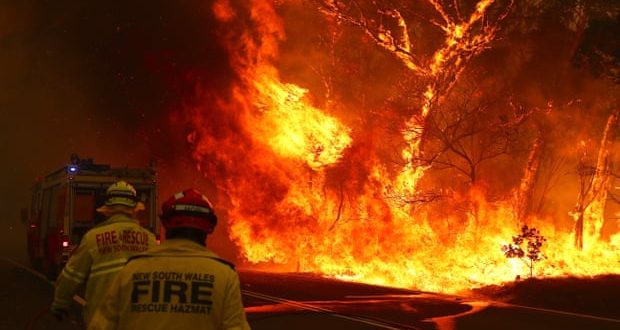Deadly heatwaves, floods and rising hunger far greater threat to world than coronavirus, scientists say
The world is “way off track” in dealing with the climate emergency and time is fast running out, the UN secretary general has said.
António Guterres sounded the alarm at the launch of the UN’s assessment of the global climate in 2019. The report concludes it was a record-breaking year for heat, and there was rising hunger, displacement and loss of life owing to extreme temperatures and floods around the world.
Scientists said the threat was greater than that from the coronavirus, and world leaders must not be diverted away from climate action.
The climate assessment is led by the UN’s World Meteorological Organization (WMO), with input from the UN’s agencies for environment, food, health, disasters, migration and refugees, as well as scientific centres.
In 2019 the oceans were at the hottest on record, with at least 84% of the seas experiencing one or more marine heatwaves. Surface air temperatures around the world were the hottest ever recorded, after a natural El Niño event boosted figures in 2016.
The report says results from the World Glacier Monitoring Service indicate 2018-19 was the 32nd year in a row in which more ice was lost than gained. The melting of land ice combined with thermal expansion of water pushed sea levels up to the highest mark since records began.
The long-term decline of Arctic sea ice also continued in 2019, with the September average extent – usually the lowest of the year – the third worst on record.
“Climate change is the defining challenge of our time. We are currently way off track to meeting either the 1.5C or 2C targets that the Paris agreement calls for,” said Guterres. 2019 ended with a global average temperature of 1.1C above pre-industrial levels. “Time is fast running out for us to avert the worst impacts of climate disruption and protect our societies.”
He added: “We need more ambition on [emission cuts], adaptation and finance in time for the climate conference, Cop26, in Glasgow, UK, in November. That is the only way to ensure a safer, more prosperous and sustainable future for all people on a healthy planet.”
Prof Brian Hoskins, of Imperial College London, said: “The report is a catalogue of weather in 2019 made more extreme by climate change, and the human misery that went with it. It points to a threat that is greater to our species than any known virus – we must not be diverted from the urgency of tackling it by reducing our greenhouse gas emissions to zero as soon as possible.”
The Guardian
 Lebanese Ministry of Information
Lebanese Ministry of Information



